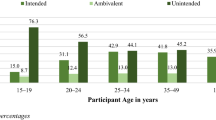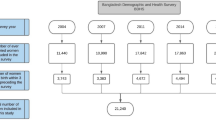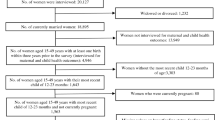Abstract
Objective:
This study aims to investigate predictors of inadequate prenatal care (PNC) use among pregnant women in Canada.
Study Design:
Data for this secondary analysis was drawn from the Maternity Experiences Survey, a cross sectional, nationally representative survey that assessed peri- and post-natal experiences of mothers aged 15 and above in the Canadian provinces and territories. PNC use was measured by the Adequacy of Prenatal Care Utilization Index. Multivariate logistic regression analysis was conducted to determine socio-economic, demographic, maternal, delivery related and health service characteristics associated with inadequate PNC use.
Results:
Prevalence of inadequate PNC was at 18.9%. Regression analysis revealed that mothers who were immigrants (odds ratio (OR)=1.40; 95% (confidence interval) CI: 1.13–1.74), primiparous (OR=1.22; 95% CI: 1.04–1.44), smoked (OR=1.33; 95% CI: 1.04–1.69) or consumed alcohol (OR=1.32; 95% CI: 1.03–1.68) during their pregnancy were more likely to receive inadequate PNC. Mothers with a family doctor as PNC provider versus those with an obstetrician (OR=1.26; 95% CI: 1.08–1.48) were more likely to have inadequate PNC.
Conclusions:
This is the first nationwide study in Canada to examine the factors associated with inadequate PNC use. Results of this study may help design interventions that target women with profiles of socio-demographic and behavioral risk to optimize their PNC use.
This is a preview of subscription content, access via your institution
Access options
Subscribe to this journal
Receive 12 print issues and online access
$259.00 per year
only $21.58 per issue
Buy this article
- Purchase on Springer Link
- Instant access to full article PDF
Prices may be subject to local taxes which are calculated during checkout

Similar content being viewed by others
References
Moos MK . Prenatal care: limitations and opportunities. J Obstet Gynecol Neonatal Nurs 2006; 35 (2): 278–285.
Society of Obstetricians and Gynaecologists of Canada SOGC Clinical Practice Guidelines: Healthy Beginnings: Guidelines for Care During Pregnancy and Childbirth vol. 71. SOGC: Ottawa, 1998.
Wildman K, Blondel B, Nijhuis J, Defoort P, Bakoula C . European indicators of health care during pregnancy, delivery and the postpartum period. Eur J Obstet Gynecol Reprod Biol 2003; 111: S53–S65.
Feijen-de Jong EI, Jansen DE, Baarveld F, van der Schans CP, Schellevis FG, Reijneveld SA . Determinants of late and/or inadequate use of prenatal healthcare in high-income countries: a systematic review. Eur J Public Health 2011; 22: 904–913.
Kingston D, Heaman M, Fell D, Chalmers B . Comparison of adolescent, young adult, and adult women’s maternity experiences and practices. Pediatrics 2012; 129 (5): e1228–e1237.
Chen XK, Wen SW, Yang Q, Walker MC . Adequacy of prenatal care and neonatal mortality in infants born to mothers with and without antenatal high‐risk conditions. Aust N Z J Obstet Gynaecol 2007; 47 (2): 122–127.
Ickovics JR, Kershaw TS, Westdahl C, Magriples U, Massey Z, Reynolds H et al. Group prenatal care and perinatal outcomes: a randomized controlled trial. Obstet Gynecol 2007; 110 (2 Pt 1): 330.
Piaggio G, Ba’aqeel H, Bergsjø P, Carroli G, Farnot U, Lumbiganon P et al. The practice of antenatal care: comparing four study sites in different parts of the world participating in theWHO Antenatal Care Randomised Controlled Trial. Paediatr Perinat Epidemiol 1998; 12 (s2): 116–141.
Guliani H, Sepehri A, Serieux J . Determinants of prenatal care use: Evidence from 32 low-income countries across Asia, Sub-Saharan Africa and Latin America. Health Policy Plan 2014; 29: 589–602.
Stativa E, Rus AV, Suciu N, Pennings JS, Butterfield ME, Wenyika R et al. Characteristics and prenatal care utilisation of Romanian pregnant women. Eur J Contracept Reprod Health Care 2014; 20: 1–7.
Delgado-Rodríguez M, Gómez-Olmedo M, Bueno-Cavanillas A, Gálvez-Vargas R . Unplanned pregnancy as a major determinant in inadequate use of prenatal care. Prev Med 1997; 26 (6): 834–838.
Kotelchuck M . The Adequacy of Prenatal Care Utilization Index: its US distribution and association with low birthweight. Am J Public Health 1994; 84 (9): 1486–1489.
Heaman MI, Moffatt M, Elliott L, Sword W, Helewa ME, Morris H et al. Barriers, motivators and facilitators related to prenatal care utilization among inner-city women in Winnipeg, Canada: a case-control study. BMC Pregnancy Childbirth 2014; 14 (1): 227.
Delvaux T, Buekens P, Godin I, Boutsen M . Barriers to prenatal care in Europe. Am J Prev Med 2001; 21 (1): 52–59.
Chalmers B, Dzakpasu S, Heaman M, Kaczorowski J . The Canadian maternity experiences survey: an overview of findings.: JOGC 2008; 30 (3): 217–228.
Heaman M . Prenatal care. In: What Mothers Say: The Canadian Maternity Experiences Survey. Public Health Agency of Canada: Ottawa, 2009; 42–46.
Tough SC, Siever JE, Johnston DW . Retaining women in a prenatal care randomized controlled trial in Canada: implications for program planning. BMC Public Health 2007; 7 (1): 148.
Pallikadavath S, Foss M, Stones RW . Antenatal care: provision and inequality in rural north India. Soc Sci Med 2004; 59 (6): 1147–1158.
Abel MH . Maternal characteristics and inadequate prenatal care. Psychol Rep 1996; 79 (3): 903–912.
Statistics Canada. Microdata User Guide: Maternity Experiences Survey, 2006. Available at http://www23.statcan.gc.ca/imdb-bmdi/document/5019_D1_T1_V1-eng.pdf. Accessed 15 November 2014.
Dzakpasu S, Kaczorowski J, Chalmers B, Heaman M, Duggan J, Neusy E et al. The Canadian maternity experiences survey: design and methods. JOGC 2008; 30: 207–216.
Liang YW, Chang HP, Lin YH, Lin LY, Chen WY . Factors affecting adequate prenatal care and the prenatal care visits of immigrant women to Taiwan. J Immigr Minor Health 2014; 16 (1): 44–52.
Paredes I, Hidalgo L, Chedraui P, Palma J, Eugenio J . Factors associated with inadequate prenatal care in Ecuadorian women. Int J Gynecol Obstet 2005; 88 (2): 168–172.
Heaman MI, Green CG, Newburn-Cook CV, Elliott LJ, Helewa ME . Social inequalities in use of prenatal care in Manitoba. J Obstet Gynaecol Can 2007; 29 (10): 806–816.
Jarvis C, Munoz M, Graves L, Stephenson R, D’Souza V, Jimenez V . Retrospective review of prenatal care and perinatal outcomes in a group of uninsured pregnant women. JOGC 2011; 33 (3): 235–243.
Boerleider AW, Manniën J, van Stenus CM, Wiegers TA, Feijen-de Jong EI, Spelten ER et al. Explanatory factors for first and second-generation non-western women’s inadequate prenatal care utilization: a prospective cohort study. BMC Pregnancy Childbirth 2015; 15 (1): 98–102.
Higginbottom GM, Morgan M, Alexandre M, Chiu Y, Forgeron J, Kocay D et al. Immigrant women's experiences of maternity-care services in Canada: a systematic review using a narrative synthesis. Syst Rev 2015; 4 (1): 13–17.
Ng C, Newbold KB . Health care providers’ perspectives on the provision of prenatal care to immigrants. Cult Health Sex 2011; 13 (5): 561–574.
Downe S, Finlayson K, Walsh D, Lavender T . ‘Weighing up and balancing out’: a meta-synthesis of barriers to antenatal care for marginalised women in high-income countries. BJOG 2009; 116: 518–529.
Bernardes AC, da Silva RA, Coimbra LC, Alves MT, Queiroz RC, Batista RF et al. Inadequate prenatal care utilization and associated factors in São Luís, Brazil. BMC Pregnancy Childbirth 2014; 14 (1): 266.
Heaman MI, Gupton AL, Moffatt ME . Prevalence and predictors of inadequate prenatal care: a comparison of Aboriginal and non-Aboriginal women in Manitoba. JOGC 2005; 27: 237–246.
Joshi C, Torvaldsen S, Hodgson R, Hayen A . Factors associated with the use and quality of antenatal care in Nepal: a population-based study using the demographic and health survey data. BMC Pregnancy Childbirth 2014; 14 (1): 94.
Asundep NN, Carson AP, Turpin CA, Tameru B, Agidi AT, Zhang K et al. Determinants of access to antenatal care and birth outcomes in Kumasi, Ghana. J Epidemiol Glob Health 2013; 3 (4): 279–288.
Raynes-Greenow CH, Roberts CL, McCaffery K, Clarke J . Knowledge and decision- making for labour analgesia of Australian primiparous women. Midwifery 2007; 23 (2): 139–145.
Hulsey TM . Association between early prenatal care and mother's intention of and desire for the pregnancy. Journal Obstet Gynecol Neonatal Nurs 2001; 30 (3): 275–282.
Bassani DG, Surkan PJ, Olinto MTA . Inadequate use of prenatal services among Brazilian women: the role of maternal characteristics. Int Perspect Sex Reprod Health 2009; 35: 15–20.
Gipson JD, Koenig MA, Hindin MJ . The effects of unintended pregnancy on infant, child, and parental health: a review of the literature. Stud Fam Plann 2008; 39: 18–38.
Miles-Doan R, Brewster KL . The impact of type of employment on women's use of prenatal- care services and family planning in urban Cebu, the Philippines. Stud Fam Plann 1998; 29: 69–78.
Passey ME, Sanson-Fisher RW, D’Este CA, Stirling JM . Tobacco, alcohol and cannabis use during pregnancy: clustering of risks. Drug Alcohol Depend 2014; 134: 44–50.
Hayeems RZ, Campitelli M, Ma X, Huang T, Walker M, Guttmann A . Rates of prenatal screening across health care regions in Ontario, Canada: a retrospective cohort study. CMAJ Open 2015; 3 (2): E236–E243.
Heaman MI, Sword W, Elliott L, Moffatt M, Helewa ME, Morris H et al. Barriers and facilitators related to use of prenatal care by inner-city women: perceptions of health care providers. BMC Pregnancy Childbirth 2005; 15 (1): 2.
Wiegers TA . General practitioners and their role in maternity care. Health Policy 2003; 66 (1): 51–59.
The Chief Public Health Officer of Canada: The Chief Public Health Officer’s Report on the State of Public Health in Canada 2009: Growing Up Well – Priorities for a Healthy Future [http://publichealth.gc.ca/CPHOreport].
Acknowledgements
This research was supported by funds to the Canadian Research Data Centre Network (CRDCN) from the Social Science and Humanities Research Council (SSHRC), the Canadian Institute for Health Research (CIHR), the Canadian Foundation for Innovation (CFI) and Statistics Canada. We would like to thank the Maternity Experiences Survey (MES) Study Group of the Public Health Agency of Canada’s Canadian Perinatal Surveillance System, and Statistics Canada who developed and implemented the MES survey. Although the research and analysis are based on data from Statistics Canada, the opinions expressed in this paper do not represent the views of Statistics Canada. We would like to thank Dr Hugh McCague (Data Analyst and Statistical Consultant at the Institute for Social Research, York University) for his analytic help and advice. We are also grateful for the analytic support of Ms Sara Tumpane (Data Analyst, York Region-Statistics Canada Research Data Centre) and Ms Carmina Ng (Data Analyst, Toronto Region-Statistics Canada Research Data Centre). No funding was available for this project.
Author contributions
YD contributed to data interpretation, manuscript drafting and write-up. CC contributed to data analysis and interpretation, manuscript drafting and write-up; HT contributed to hypothesis conception, supervision of data analysis and interpretation, drafting and write-up of the paper. MR and MES critically reviewed drafts of the manuscript. All authors provided critical insight and revisions to the manuscript; all authors read and approved the final version of the manuscript submitted for publication.
Author information
Authors and Affiliations
Corresponding author
Ethics declarations
Competing interests
The authors declare no conflict of interest.
Rights and permissions
About this article
Cite this article
Debessai, Y., Costanian, C., Roy, M. et al. Inadequate prenatal care use among Canadian mothers: findings from the Maternity Experiences Survey. J Perinatol 36, 420–426 (2016). https://doi.org/10.1038/jp.2015.218
Received:
Revised:
Accepted:
Published:
Issue Date:
DOI: https://doi.org/10.1038/jp.2015.218
This article is cited by
-
Perinatal Risks of Neonatal and Infant Mortalities in a Sub-provincial Region of China: A Livebirth Population-based Cohort Study
BMC Pregnancy and Childbirth (2022)
-
Expectations and experiences of women regarding maternal healthcare services in Pakistan: challenges and lessons to be learnt
Journal of Pharmaceutical Policy and Practice (2021)
-
Retaining participants in community-based health research: a case example on standardized planning and reporting
Trials (2020)
-
Factors associated with the timing of the first prenatal ultrasound in Canada
BMC Pregnancy and Childbirth (2019)
-
Inequities in utilization of prenatal care: a population-based study in the Canadian province of Manitoba
BMC Pregnancy and Childbirth (2018)



